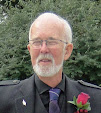The drugs companies come in for lots of flack particularly for charges and profits. Regardless of that one has to remember that it is drugs companies who finance and develop new drugs.
I'm in Glasgow at the moment having just had my three-day 16-weekly review for a drugs trial which I've been on since September 2017.
Briefly, my cancer started getting bolshie again in 2017 after nearly 20 years of various treatments since the operation to remove the cancer in 1998.
The Advanced Nurse Practitioner who has 'looked after' my treatment since 2006 asked if I would like her to see if she could get me onto a drugs trial which she thought might benefit me. She was successful and I've been on the trial since then. It was a 30:70 double blind trial which basically means that only the drugs company knows who is on the 70% having the real drug and who is on the placebo. The benefits for me were spectacular when I took the first set of tablets (which suggested that I was on the real drug not the placebo) because there was a dramatic physical reduction in the cancer indicators. Last year the results of the trial were sufficient for the trial purposes and the placebo users were offered the opportunity to go on the real drug. It's now coming to an end. However the drugs company now has to get the drug licensed in every country worldwide.
I was one of 48 UK participants out of 1509 volunteers worldwide in 36 countries.
This is one of thousands of worldwide drugs trials. Some will prove to be effective and some will not. Some will end up as drugs for patients and some will not. All cost a great deal of money.
When I was first diagnosed with my cancer the only treatments were surgery and radio therapy and hormone therapy. Over the years I've had all three. Now there are many treatments including various chemo-therapies and many more drugs.
So whatever the reality of the profits and morals of the drugs companies I, for one, am very grateful that they take all the risks and develop pioneering drugs and treatments.



